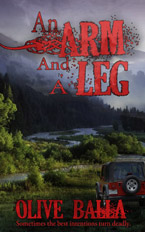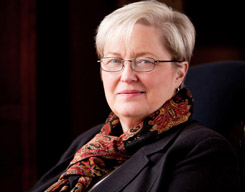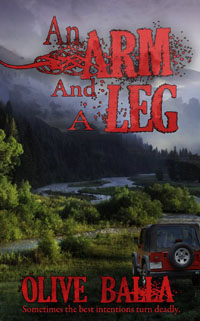by Olive Balla
Science tells us no two humans are exactly alike, that each of us is a distinctive amalgamation of DNA and life experiences. It follows, then, that inside every writer lives a one-of-a-kind Voice, a Voice I believe resides not only in the brain, but in the gut. And it’s never too late to find it.
Searching for my Voice as a writer has been an interesting process. It has not been as easy as I thought it would be, but after nearly twenty years of plugging away, some things are finally beginning to click. My writer’s Voice is making herself heard. And it’s been an amazing trip of self-discovery, albeit one that is taking place late in my life.
I always assumed clever writing to be just a matter of focusing one’s mental faculties. I thought anyone plopped down into the right scenery could crank out creative, imaginative stuff that people would clamor to read. Cool stuff, the warp and woof of which open up new neural pathways in the reader’s brain, the cadence of which draws the reader in and compels him to better himself, or the cocoon of which offers solace to one overwhelmed with the pain that life inflicts upon the living.
But from the moment I first put my fingers on the keys of my laptop, I realized that was a false hypothesis. Great writing is not merely the result of a writer’s ability to wax cerebral. Great writing springs from the craftsman’s ability to connect with his unique Voice.
Early on in my writing career, I tended to pattern my own writing after that of some of my favorite authors. I mimicked Agatha Christie, Helen McInnes, and even Isaac Asimov. It was as if I could plug into a writer’s version of one of those electronic voice filtering gizmos. You know, the things that have the ability to make a five-year-old girl sound like James Earl Jones.
And why not ape the best of the best? After all, the greats became so by opening their writer Voices full-throttle. Copying their Voices saved me the trouble of having to search for my own.
I soon discovered, however, that the trouble with writing in someone else’s Voice is that it pushed my own into the periphery. But as is the way of things, even as I felt secure in my not-me mask, my authentic Voice would stubbornly make herself heard. And the more often I glimpsed her, the more determined I became to give her air.
Pursuant to that end, I bought some books guaranteed to catapult my writer’s Voice into up-and-running mode. Each author offered a list of tried-and-true strategies to get one’s metaphorical peristaltic muscles moving “in no time at all.”
One interesting how-to suggested I dress, act, and talk like one of my characters for a day. Another told me to flood my senses with potpourri and my favorite instrumental music while writing. Yet another commanded me to meditate on the meaning of life while staring at my navel.
I did all that. And I found it interesting. However, while those strategies may be effective devices for some, they didn’t work for me. My explain-everything-so-the-kids-can-understand-and-pass-the-test inner teacher didn’t seem to want to let go of the controls.
That is, until I discovered something called free writing. Here’s how it works: I sit comfortably at my desk, a pen and pad of paper in front of me. I clear my mind as much as possible, and then write whatever thoughts pour forth. I don’t censor anything. Sometimes I write the same word several times, and sometimes the result is meaningless drivel. But often, fun and exciting things pop onto the page. Things I’ve then built into stories–uniquely my own.
According to a Dutch proverb, “We get too soon old and too late smart.” While there’s something to that, it’s encouraging to note that Mary Wesley didn’t get published until she was 71; Colonel Harlan Sanders didn’t start up his first Kentucky Fried Chicken establishment until he was 66; the famous American artist known as Grandma Moses didn’t begin painting until in her seventies, and Laura Ingalls Wilder wrote and published her Little House books when in her sixties.
So, my evenings and weekends are spent spelunking into the caverns inhabited by my Voice, relishing the tasty morsels she leaves in the pathway for me to follow. And I, in turn, saw away at the chains forged by the fear of being seen as different, fear of making mistakes, fear of rejection, and the fear that it’s too late. Because, it’s never too late. It’s NEVER too late.
 Olive Balla, author of suspense novel An Arm and a Leg, is mother of 3, grandmother to 13, great-grandmother of 4, a retired educator, and part-time professional musician. Having been everything from secretary at a used car dealership, a university student, and a high school Spanish teacher, Balla states her characters are, in part, amalgamations of people she’s met. Living with her husband Victor in the Albuquerque area, she spends her spare time in a small woodworking shop designing and building everything from breadboxes and wine racks, to a porch bench. Visit her website at omballa.com.
Olive Balla, author of suspense novel An Arm and a Leg, is mother of 3, grandmother to 13, great-grandmother of 4, a retired educator, and part-time professional musician. Having been everything from secretary at a used car dealership, a university student, and a high school Spanish teacher, Balla states her characters are, in part, amalgamations of people she’s met. Living with her husband Victor in the Albuquerque area, she spends her spare time in a small woodworking shop designing and building everything from breadboxes and wine racks, to a porch bench. Visit her website at omballa.com.
This article was originally published in the April 2012 issue of SouthWest Sage and is reprinted here by permission of the author.




























